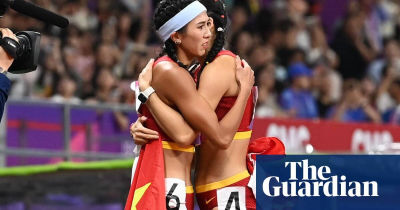The Guardian-Chinese censors block Tiananmen image of athletes hugging
October 3, 2023 3 min 461 words
虽然你身处的环境,或多或少会影响你的心情,但有些事也依然取决于你自己。
A photograph of two Chinese athletes hugging after a race has been censored on Chinese social media because the women’s race numbers inadvertently formed a reference to the Tiananmen Square massacre in 1989.
Lin Yuwei and Wu Yanni, China’s entrants in the women’s 100m hurdles final, embraced after the race at the Asian Games in Hangzhou. Lin won gold in the race with a time of 12.74 seconds. A photograph of the two women in profile showed Lin’s lane number, 6, next to Wu’s lane number, 4.
10月1日,杭州亚运会田径女子100米栏决赛,中国选手林雨薇与吴艳妮互相拥抱鼓励。
— 李老师不是你老师 (@whyyoutouzhele) October 2, 2023
但是因为照片中两人的号码组成了“六四”,导致图片在墙内被夹。
目前仅有零星几家媒体的照片还没有被封禁。 pic.twitter.com/Q40hbGzqby
“6/4” is a common reference to the Tiananmen Square massacre in the early hours of 4 June 1989. Discussion of the killings and the protests that preceded them are strictly controlled in China, with a wide range of references routinely scrubbed from China’s internet.
Posts on Weibo that mention the two athletes hugging showed grey squares where the photograph should have been.
The censorship was not comprehensive. Some Chinese news articles showed pictures of the two women hugging, including their lane numbers. Internet censorship in China, particularly of images, is often done on an ad-hoc basis with human monitors deciding which posts to restrict. In 2017, Weibo, one of China’s biggest social media platforms with nearly 600 million monthly users, said it employed 1,000 “supervisors” to report on “pornographic, illegal and harmful” content.
The race, which took place on China’s National Day on 1 October, was overshadowed by another controversy involving one of the Chinese athletes.
Wu was given a red card at the start of the race for a false start. After protesting against the decision she was allowed to run, finishing second, 0.03 seconds behind her teammate Lin. Shortly after the race, however, Wu was disqualified, allowing India’s Jyothi Yarraji to claim silver.
That Wu had been allowed to run at all prompted concern that race officials were reluctant to disqualify one of China’s star athletes, regardless of sporting rules. Mark Dreyer, a China-based sports analyst who was in the stadium for the event, wrote afterwards: “It just felt like the local officials needed to find a way to let Wu run”.
Hours after the disqualification, Wu apologised to her fans on Weibo. “I am very sorry that I was disqualified due to a false start. I failed to live up to everyone’s expectations and disappointed everyone!”
Wu’s post received tens of thousands of supportive comments. On Weibo, posts from ordinary netizens showing the greyed out squares of Wu and Lin’s “6/4” hug, the comments were more muted. One Weibo user wrote: “The 1989 Asian Games”.
Additional research by Chi Hui Lin

